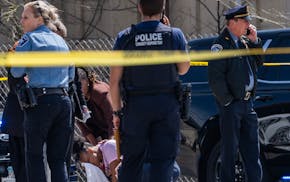Opinion editor's note: Strib Voices publishes a mix of commentary online and in print each day. To contribute, click here.
•••
The solo part of the Cleveland Browns football cheer goes like this:
Here we go Brownies, here we go!
The chorus response is this:
Woof, Woof!
Repeat the cheer three times and hold your breath and pray.
I suppose even sharing that cheer is geographically inappropriate given that this past week I became an official resident of Minnesota with a residential mailing address. So, it's probably fair to ask why I'm bothering to mention that I'm a long-suffering fan of the Browns (1-2) on the same weekend that the Minnesota Vikings (3-0) are lighting a glide path to a potential NFC championship, if not more. That isn't a jinx attempt.
Sports are an essential form of social currency. Events like the Olympic Games, professional, collegiate and prep sports bring people together even through fierce rivalries. I loathe the Steelers but have a healthy respect for the city and people of Pittsburgh. Sports create an environment for seamless appreciation for communities near and far.
I recently found a slice of Cleveland, Ohio, on Hennepin Avenue in downtown Minneapolis. The place is called Mackenzie Pub. The tavern bills itself as a Scottish bar with an Irish theme. On Sundays, the place turns into a mini–Dawg Pound, where Browns fans can gather to commiserate, cry and cheer their hearts out. No other games are available for viewing at Mackenzie while the Browns are playing.
I've been to the Browns Backer's bar three times, and already made fast Sunday afternoon friends. During commercials or at halftime, we talk about topics other than football, such as food, boating, the weather, and mostly anything that falls short of a sharp turn into political chatter.
In a deeply polarized country and world that produces an endless succession of disturbing and frightening headlines, the civil gathering of people united over a shared interest or a positive neighborly agenda matters.
A 2023 Pew survey found that Americans are less likely than others around the world to feel close to people in their country or community. The survey also found that fewer than half of U.S. adults under 30 feel close to other Americans.
Why is that? What has happened to our collective sense of community, and how can it be reclaimed?
With the general election less than six weeks away, we will continue to be bombarded with messages reminding us how deeply divided we are along political and class divides. The message of division and polarization will often echo louder than messages of community and celebration of connective tissue that positively bind us together.
Part of our evolving mission at the Minnesota Star Tribune Opinion division is to continue to identify and amplify important and diverse voices that advance a better understanding of the common good. It's what brought me to Minnesota.
Woof Woof!
Morris: State workers return, St. Paul stirs — but will it stick?


